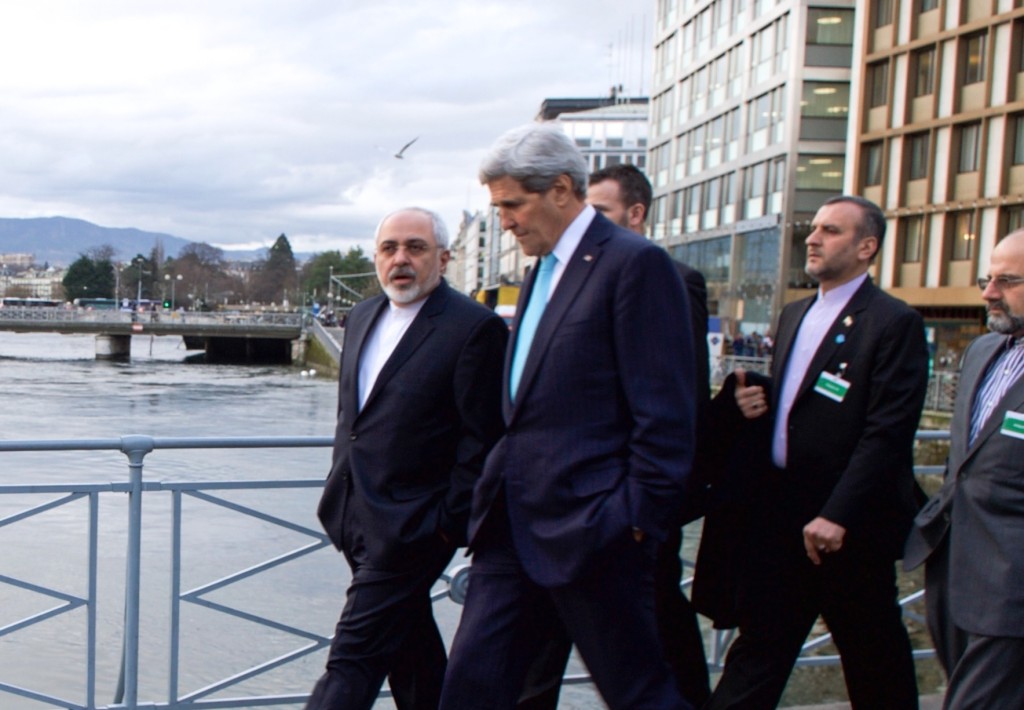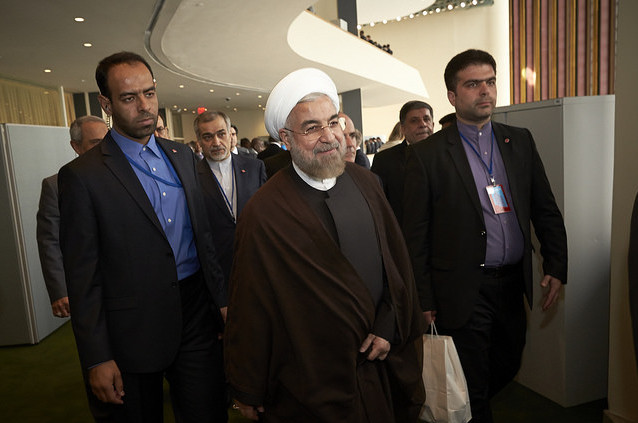The alternative to a bad deal with Iran isn't no deal or war – it's a good deal, which meets universal requirements to prevent a nuclear breakout.
The details from the emerging Iran deal are legitimate cause for concern, regardless of one's opinion of Netanyahu's tactics • All the evidence points to Iran playing a duplicitous game to ensure that maximum and strict transparency – the sine qua non for ensuring they do not achieve a nuclear breakout – never happens • If the world wishes for Israel to get on board with a deal, it must find a genuine solution to its concerns

In his recent book Nuclear Iran (Harvard University Press, 2014), Jeremy Bernstein notes that centrifuge plants are simpler to conceal than nuclear reactors. Under the terms of a nuclear deal between Iran and the EU3+3 (Britain, France, Germany, China, Russia, and the United States) that have been made public, there was no mention of inspection or verification at undeclared facilities in Iran that may contain concealed centrifuge sites. Iran’s military sites, for example, will likely be off limits to inspectors under the terms of a prospective deal. Inspection and verification is only being discussed in relation to Iran's enrichment cycle (manufacturing the fissile material for a bomb).
Yet the only way anyone can be confident that Iran is not secretly violating the terms of an agreement is to make the entire Iranian nuclear program transparent. This should include the outstanding status of the Possible Military Dimensions (PMD) of Iran's program (which falls outside the framework of the current negotiation), Iran's ongoing ballistic missile development (missiles that are used almost exclusively to deliver nuclear warheads), and the nuclear research and development that takes place at Iran's military sites like Parchin, which have been off-limits to international inspectors.
Transparency Above All
Curiously, transparency has been absent from the public discussions about a deal. In a recent New York Times op-ed, “Deterring an Iranian Nuclear Breakout,” Robert Einhorn uses the phrases "intrusive verification provisions" and "robust inspections" to describe how Iran's enrichment program would be monitored under the terms of a prospective deal. Newly appointed U.S. Deputy Secretary of State Anthony J. Blinken also told the New York Times that “highly intrusive inspections” would be required, but the details of which were still being negotiated. The International Crisis Group consistently uses the phrase "intrusive" to refer to how Iran's program would be monitored under the terms of a negotiated deal. In its May 2014 report (p. 22), the Crisis Group states that Iran "appears much more willing to accept additional transparency measures," implying that transparency has degrees.
This misimpression may come from Iranian President Hassan Rouhani’s own rhetorical sleight-of-hand. In his first news conference after being elected in June 2013, Rouhani told the media that Iran’s nuclear program is “completely transparent,” but at the same time he also added that Iran was ready “to show greater transparency.” However, allowing Iran additional enrichment capacity in exchange for ‘additional’ transparency at existing facilities is a fool’s bargain because as Jeremy Bernstein suggests in Nuclear Iran, additional enrichment is likely to be conducted at a concealed facility that is unknown to inspectors. In other words, inspection and verification should not be limited to Iran’s enrichment infrastructure. A deal should provide inspectors with a broad mandate for verification that includes both declared and undeclared nuclear sites in Iran.
Suspected nuclear activities at Iran’s military sites need to be addressed in the framework of the current negotiations. In October 2014, IAEA Director General Yukiya Amano told an audience at the Brookings Institution that the IAEA was “unable to provide credible assurance about the absence of undeclared nuclear material and activities. The Agency therefore cannot conclude that all nuclear material in Iran is in peaceful activities.” The Institute for Science and International Security (ISIS) noted that recent satellite imagery of the Parchin military site, where Iran is believed “to have conducted work related to nuclear weapons development,” indicates “that Iran may be engaging in new asphalting at the site, efforts likely aimed at concealing past banned activities.” When asked about providing access to its military sites, Iranian officials told the Crisis Group “Disruptive visits to our military installations exacerbate the paranoia of those in Iran who believe that the West is seeking to subvert the regime, just as it happened in Iraq after Saddam was defeated in the first Gulf War. It is also a question of dignity” (footnote 124, p. 22)." Will the tyranny of Iran’s paranoia and dignity prevent negotiators from making reasonable demands for immediate access to such sites as part of any final deal?

Iran's "Good Cop-Bad Cop" Routine
The machinations of Hassan Rouhani’s negotiating team and Iran's Supreme Leader, Ali Khamenei, often seems like a parody of the “good cop-bad cop” routine. Khamenei has expressed reluctant ambivalence about the prospects of a deal, but most of the time he appears to oppose a deal, expressing his deep-seated skepticism that a deal is simply a ruse to deny Iran its legitimate scientific achievements and pave the way for fomenting regime change from within. It’s impossible to know what Khamenei truly believes, but it is fair to say that he does not think the Islamic Republic of Iran can trust any deal with the West. Further, Khamenei must be careful not to alienate the Pasdaran (IRGC) and Basij elites, who may feel that keeping “the nuclear pot boiling,” is in their economic and political interests. Self-interested military officers and security officials might elect to use the extended confrontation with the West as a means to advocate for seeking stronger and deeper commercial, military, and political relations with China and Russia.
Khamenei’s skepticism—and his inclination to support his military elites—has allowed President Rouhani and his team to convince the West that a favorable deal will empower Rouhani's more technocratic policies and win Khamenei's unreserved support by reviving Iran’s economy and reintegrating it into global markets. However, Rouhani’s vision is genuinely different from Iran’s military elites—and perhaps even Khamenei’s—in that he believes that Iran needs to lure Western capital, in particular European investors, back to Iran. Ultimately, this would diversify Iran’s economy and weaken the Pasdaran’s grip on Iran’s economy, perhaps reducing its political influence as well—something which would favor Rouhani and his supporters. These two different visions for Iran have created the impression among some in the West that the current negotiation is not just over the future of Iran's nuclear program but also over the future direction of the Islamic Republic of Iran itself. This raises a very important question: Should the EU3+3 be concerned with how a deal will influence Iran's complex domestic politics?
Former CIA case officer Reuel Marc Gerecht argues that it is a delusion to expect the Islamic Republic of Iran to change its orientation, regardless of Rouhani and the Khamenei’s differences about the future direction of Iran’s political economy. Gerecht argues that “If well-meaning and Persian-speaking academics can ignore the mountain of primary material about Ali Khamenei’s ferocious hatred of the United States and the West, or about Rouhani’s pivotal role in Iran’s nuclear-weapons quest and in the regime’s unrivaled use of terrorism and assassination abroad, then it’s easy for extremely busy government officials, who don’t have much time to read boring English translations of Iranian speeches, to ignore the historical record.” Gerecht would likely agree with the Crisis Group’s Iran analyst, Ali Vaez, who recently wrote that when it comes to the negotiations, it seems likely that Khamenei and Rouhani are on the same page.

Israel is Right to be Worried
Therefore, in a good deal with Iran, transparency should have no gradations. “Additional transparency” or “greater transparency,” the term used by President Rouhani, is redundant. Iran’s nuclear program is either transparent or it is not. If a deal contains limited and poorly defined terms of inspection and verification that only applies to part of Iran nuclear activities, then enforcement will also be constrained and weak. This is a legitimate and serious concern. Will it also be dismissed by using the argument that full transparency is simply too much to expect from the Iranians? That, like zero enrichment, it is simply unattainable?
Israel is not a party to the nuclear negotiation with Iran, but it will be expected to abide by its terms. In his new book, World Order, Henry Kissinger notes that "the quest for an agreement must contend with the prospect that Tehran will be exploring a strategy of relaxing tensions just enough to break the sanctions regime but retaining a substantial nuclear infrastructure and a maximum freedom of action to turn it into a weapons program later" (p. 163). One may take issue with how Israel has publicly expressed its reservations about a prospective deal, but Israel's concerns are precisely those articulated by Kissinger. They are legitimate concerns and the terms of a nuclear deal with Iran should address them on their merits. In other words, the alternative to a weak deal is a strong one.
Professor Uzi Rabi teaches at the Department of Middle Eastern and African History at Tel Aviv University. He is also Director of TAU's Moshe Dayan Center for Middle Eastern and African Studies.
Dr. Brandon Friedman is a researcher at the Moshe Dayan Center, where he specializes in Iran-Arab relations and the modern history of the Persian Gulf States.
To receive updates on new articles in English, join Mida on Facebook or Twitter or join our mailing list.





כפסיכולוג קליני וכמי שעשה גם תואר בפסיכיאטריה,ללא תואר ורפואי של מ.ד.ושעסק בפסיכולוגיה של הבדוים והערבים וביודעי שהאיראנים,אינם ערבים , אך נקראו פרסים לפני שהם חשבו את עצמם כמורמים מעם. הנני נוכח לדעת שהההיסטוריה חוזרת על עצמה ,באותה מידה כמו המלחמות בין היונים והפרתים. זהו מאבק תרבותי ופסיכולוגי בין תרבות המערב ותרבות המזרח. המערב לא יודע וקולט את דרך המחשבה המזרחית כפי אותו משפט ידוע"מזרח הוא מזרח ומערב הוא מערב והם לא יפגשו. אובמה צריך איזה הוא הישג , הזו.אולי כדי לקבל פרס נובל שני ,אך המערב ישלם את המחיר הכבד ,על עצימת העינים